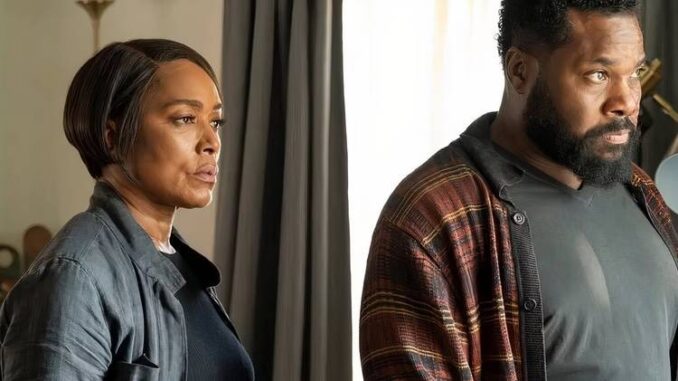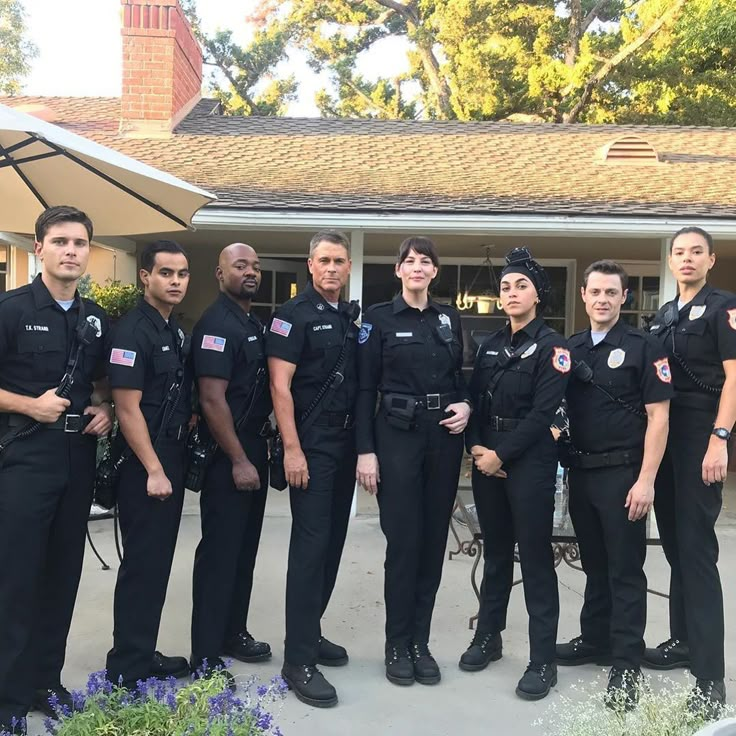
Soon after the fire that puts Bobby into a coma, Athena seeks out Amir looking for payback. He admits to feeling jealous of the life Bobby rebuilt, but adamantly denies having anything to do with the fire, which turns out to be true. That emotional confrontation adds even more depth when you learn how Warner initially took the role. In an interview with TV Insider, he revealed that showrunner Tim Minear originally envisioned Amir as an antagonist. “I was thinking I was coming in, I was going to be the villain,” Warner said.
But after Amir’s first episode aired, it became clear that the character deserved a different path. That change is a direct reflection of Warner’s performance, which humanized a man consumed by loss yet still guided by a powerful moral compass. Instead of leaning into revenge or destruction, Amir’s story became one about grief, accountability, and the possibility of connection. In their final scene, standing in the burned ruins of the Nash home, Amir delivers a powerful and devastating monologue. He tells Bobby he can’t forgive him, but he respects him. It’s a “pep talk” of sorts, and one of the most powerful scenes in the show’s run, anchored by Warner’s quiet control.
Warner had expressed interest in returning to 9-1-1. He joked that Minear floated the idea of Amir marrying a plastic surgeon so he wouldn’t have to endure hours of prosthetic makeup again. Though Amir’s arc felt complete, there was always room for the character to return, and the show clearly left the door open. Tragically, with Warner’s passing, that door is now closed. We won’t get to see where Amir’s story might have gone next.
The loss of Malcolm-Jamal Warner is immeasurable. His presence on screen, whether as a sitcom teenager finding his voice or a broken man confronting unthinkable pain, was always magnetic. In a show like 9-1-1, known for explosive rescues and emotional twists, Warner reminded viewers that sometimes the most understated performances are the most powerful. Amir challenged Bobby in ways few characters ever have, and Warner turned what could have been a one-note role into something unforgettable. His performance, and his legacy, will be remembered.
You know those TV characters that sneak up on you and then—bam!—you’re hooked? That’s exactly what Malcolm-Jamal Warner did with Amir in 9-1-1. Originally a supporting figure, Warner’s gripping portrayal turned Amir into an emotional centerpiece that reshaped the entire character arc. Let’s dive deep into how his performance added unexpected depth, emotional complexity, and raw humanity to a role that could have otherwise faded into the background.
Understanding the ‘9-1-1’ Universe
A Quick Glance at the Show’s Concept
9-1-1, the hit procedural drama, isn’t your run-of-the-mill emergency responder show. It blends intense action with deeply personal storytelling. From natural disasters to emotional meltdowns, every episode is a rollercoaster—and that’s what makes it so compelling.
Where Amir Fits into the Picture
Enter Amir—an ex-military medic navigating the civilian world. While not a series regular at first, Amir becomes a pivotal character who brings both emotional weight and grounded realism to the team.
Who Is Malcolm-Jamal Warner?
From Theo Huxtable to Acclaimed Actor
Most know him as Theo from The Cosby Show, but Malcolm-Jamal Warner has been evolving for decades. With critically acclaimed roles in The People v. O. J. Simpson, The Resident, and American Crime Story, Warner has proven his versatility and dramatic chops.
A Mature Actor Ready for Complex Roles
What sets Warner apart now is his ability to dig into layered characters—and Amir is no exception. His portrayal is thoughtful, emotional, and gritty without being over-the-top.
The Introduction of Amir in ‘9-1-1’
Amir’s Backstory—More Than Just a Medic
Amir isn’t just a paramedic. He’s a man with a military past, haunted by trauma, wrestling with PTSD, and trying to do good in a world that’s often cruel. Warner takes all of that and runs with it, transforming Amir from a character into a symbol.
A Subtle Yet Powerful First Impression
In his early scenes, Warner doesn’t oversell Amir. Instead, he lets the character breathe—quiet strength, lingering glances, and moments of hesitation that speak volumes.
Warner’s Method: Bringing Amir to Life
Emotional Authenticity That Hits Home
Warner delivers emotion like a slow burn. Whether it’s a shaky breath before answering a distress call or the far-off stare of someone reliving battlefield trauma, he makes you feel Amir’s pain.
Nuance Over Noise
What’s brilliant is how Warner avoids melodrama. No screaming matches or teary breakdowns just for the sake of drama. Instead, it’s about silence, stillness, and subtleties.
Building a Relatable Character Through Vulnerability
Amir becomes someone you want to root for—not because he’s flashy, but because he’s real. And in a show packed with action, that realism becomes even more impactful.
How Amir’s Arc Changed Because of Warner
Scripted vs. Performed—Two Different Realities
Sometimes a character’s trajectory shifts mid-show, and Warner’s performance made that necessary. What may have been written as a background role grew into a major emotional thread.
Warner Turned Amir into the Emotional Compass
From providing calm during chaos to having one of the most touching personal journeys, Amir became the emotional center in several episodes. That shift can be directly credited to Warner’s powerful presence.
How the Writers Took Note and Adapted
Behind the scenes, it’s no secret that writers adjust based on standout performances. Warner’s portrayal was so compelling that the showrunners began to lean into Amir’s backstory, giving him more screentime, better arcs, and richer dialogue.
Standout Episodes That Showcased Amir’s Transformation
The PTSD Episode—A Masterclass in Controlled Emotion
This episode was Amir’s spotlight. Warner brought out the internal war his character was still fighting, leaving viewers emotionally gutted in the best way possible.
The Rescue Gone Wrong—When Leadership Shines
In another standout moment, Amir took charge during a rescue mission gone sideways. Warner’s performance showed both physical grit and mental resilience, marking a turning point in his character arc.
Viewer Reactions: Social Media Explodes
Fan Praise Across Twitter and Reddit
After Amir’s deeper episodes aired, fans took to social media to pour their hearts out. “Give Malcolm-Jamal Warner all the awards,” one fan tweeted. Others demanded he be added to the main cast.
Emotional Impact: A Common Theme
Comments often revolved around how Amir’s story resonated with veterans, trauma survivors, and everyday viewers alike. That kind of universal emotional hit? Rare—and powerful.
Industry Recognition and Critical Acclaim
Awards Buzz and Critical Applause
Though Warner didn’t initially receive award nods for 9-1-1, critics lauded his performance. Several outlets named his portrayal among the most underrated of the year.
A Reminder That Great Acting Doesn’t Always Shout
Warner didn’t need a spotlight. He became the spotlight. And that’s what critics respected—his ability to carry weight quietly and confidently.
Why Amir’s Arc Resonated So Deeply
Realism Meets Empathy
Amir’s journey wasn’t sugar-coated. It was raw, broken, hopeful—and that mix mirrored real-life experiences. Warner’s touch ensured the story didn’t feel like fiction.
A Mirror for Viewers’ Own Battles
In many ways, Amir’s arc served as a reflection for people dealing with unseen wounds. And when an actor can make a character that relatable? That’s magic.

Warner’s Performance Elevated the Entire Show
Raising the Emotional Stakes
By bringing so much depth to Amir, Warner upped the emotional stakes for everyone around him. Other characters began to open up more. Tensions hit harder. Losses stung deeper.
A Ripple Effect Across the Cast
It’s no exaggeration to say Warner’s presence made others step up. His grounded energy elevated the ensemble and pushed the storytelling into more human territory.
Conclusion: A Performance That Rewrote the Script
Malcolm-Jamal Warner didn’t just play Amir—he reshaped him. Through subtle emotion, raw vulnerability, and undeniable presence, he changed the direction of his character arc and left a lasting imprint on 9-1-1. Amir may not have started as a central figure, but Warner’s performance ensured he ended as one. And in the world of TV drama, that kind of transformation is rare—and unforgettable.